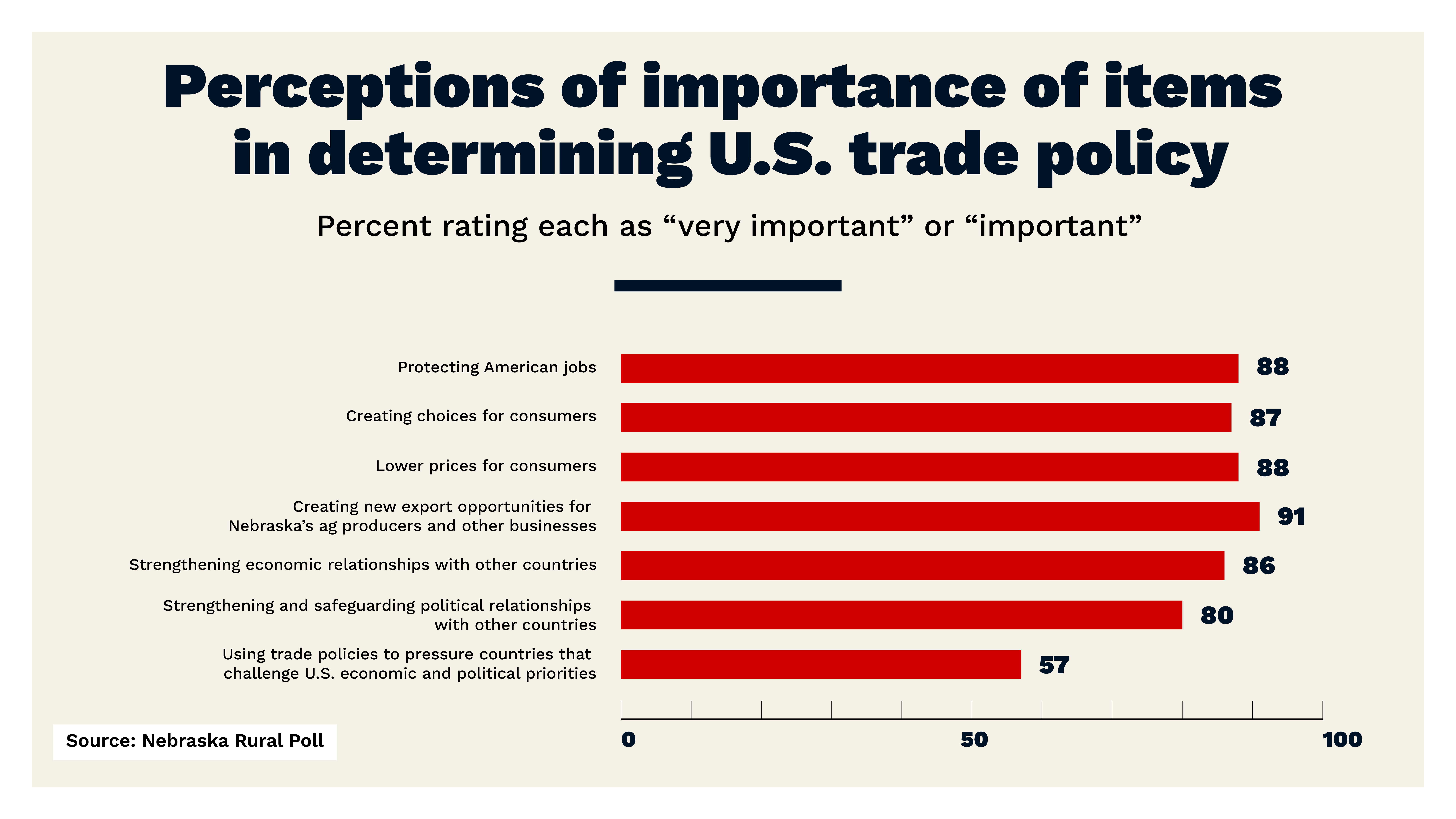
Rural Nebraskans continue to value protecting American jobs, creating choices for consumers and fostering political relationships with other countries as important components of U.S. trade policy, according to the 2025 Nebraska Rural Poll. Amid ongoing trade issues, those findings are similar to last year’s; however, there are differences in other areas.
This year, more rural Nebraskans surveyed rate lower prices for consumers as very important (from 51% last year to 56% this year). Similarly, more respondents rate strengthening economic relationships with other countries as very important (from 41% last year to 47% this year).
“Even with the implementation and threat of new tariffs since we conducted our 2024 survey, we didn’t see big changes in how rural Nebraskans view trade policy,” said Becky Vogt, survey manager for the Rural Poll. “The items that did see increased importance, though, suggest they are paying more attention to economic concerns — where we get our goods and how much we’re paying for them.”
Overall, most respondents think protecting American jobs, lowering prices for consumers and creating new export opportunities for Nebraska’s agricultural producers and other businesses are very important considerations in determining trade policy.
Almost six in 10 rural Nebraskans surveyed think protecting American jobs (57%) and lowering prices for consumers (56%) should be very important in determining trade policy. Just more than half think creating new export opportunities for the state’s agricultural producers and other businesses (54%) should be a very important consideration. Many rural Nebraskans rate strengthening economic relationships with other countries (47%), strengthening and safeguarding political relationships with other countries (42%), and creating choices for consumers (42%) as very important considerations. However, only 28% rate using trade policies to pressure countries that challenge U.S. economic and political priorities as very important.

“These responses show that rural Nebraskans view trade policy through the lens of their household budgets and local economies,” said Brad Lubben, associate professor of agricultural economics at the University of Nebraska–Lincoln. “Protecting jobs, keeping prices manageable and supporting agricultural exports rise to the top because they directly affect rural livelihoods. The data remind us that trade decisions made in Washington have very real consequences for families, businesses and communities across rural Nebraska.”
Not all poll respondents rate these items the same. Those working in construction, installation or maintenance (80%) are more likely than those in management, professional or education occupations (42%) to say protecting American jobs should be a very important consideration in determining national trade policy.
Lower prices for consumers is more important to younger people, according to the poll. Seventy-seven percent of respondents 19 to 29 think lower prices should be a very important consideration, compared to 49% of those 65 and older. And, even though using trade policies to pressure countries that challenge national economic and political priorities was not seen as a high priority for most rural Nebraskans, many persons working in agriculture (43%) say it should be a very important determinant.
“Trade policy doesn’t impact everyone the same way,” Lubben said. “Younger Nebraskans are focused on costs of living, workers want to protect their jobs, and those in agriculture are thinking about how trade policy affects global competition and export opportunities. Together, the data highlight the diverse priorities within rural communities and the need for trade policy that balances those perspectives.”
The “Trade Policy” report and its implications for rural Nebraska will be highlighted during a Rural Poll webinar at noon Oct. 9. Lubben will lead the discussion with special guest Jill O’Donnell, director of the university’s Clayton Yeutter Institute of International Trade and Finance. Register here.
The 2025 Nebraska Rural Poll marks the 30th year of tracking rural Nebraskans’ perceptions about policy and quality of life, making it the largest and longest-running poll of its kind. This summer, questionnaires were mailed to more than 6,700 Nebraska households, with 943 households from 86 of the state’s 93 counties responding. The poll carries a margin of error of plus-or-minus 3%. Conducted by Rural Prosperity Nebraska with funding from Nebraska Extension, the Rural Poll provides three decades of data on the voices of rural Nebraskans. Current and past reports are available here.
Share
News Release Contact(s)
Related Links
Tags
High Resolution Photos








